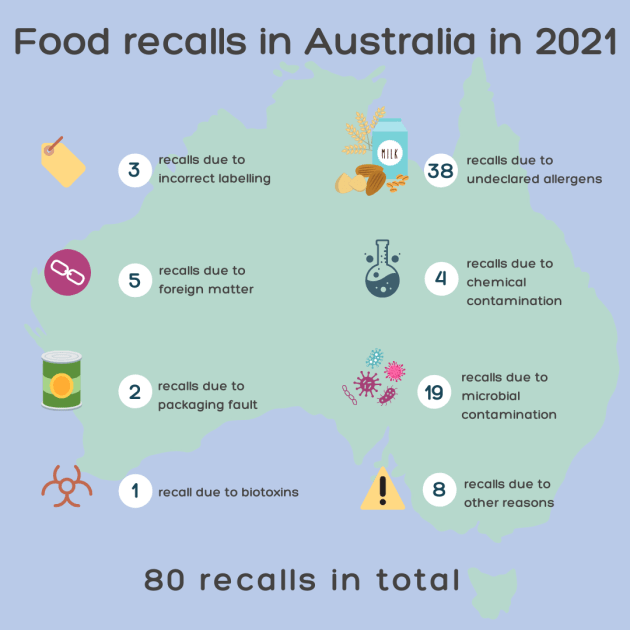Latest figures from Food Standards Australia New Zealand (FSANZ) show 80 food recalls in 2021. An increase in the 10-year average from 76 to 78 per year shows the food recall systems is working well, the statutory agency says.
FSANZ classifies recalls into eight categories: undeclared allergens, microbial contamination, foreign matter contamination, biotin contamination, packaging fault(s), chemical/other contaminant(s), labelling error(s), and other.
In 2021, there were 38 recalls for undeclared allergens, 19 for microbial contamination, 5 for foreign matter, 8 for other, 1 for biotoxin, 2 for packaging, 4 for chemical/contaminant, and 3 for labelling.

“Most recalls are precautionary and initiated by food businesses to ensure that potentially unsafe food is removed from distribution and sale. Only a small number of recalls are linked to a suspected or confirmed illness/injury.
“Over time broader regulatory oversight, improved self-monitoring by food businesses and greater consumer vigilance have helped to strengthen problem detection.
“Continued advancements in food technology, analytical testing and traceability are also expected to influence the number of food recalls,” FSANZ said.
FSANZ said food recalls for undeclared allergens, microbial contamination, chemical/contaminant and ‘other’ show an increasing trend while recalls due to foreign matter is declining.

Between 2012-2021, the most recalled foods were mixed and/or processed food, likely due to the wide range of foods categorised under the heading. It includes most long-life packaged food and manufactured items that contain multiple ingredients.
Breads and bakery products (breads, biscuits, cakes, and pastries) were the second most recalled food category, with fruit, vegetables, and herbs the third.
In the decade, the most common reason for being recalled was due to undeclared allergens (335 recalls, 43 per cent). The most common undeclared allergens were milk (100 recalls, 30 per cent), multiple allergens (57 recalls, 17 per cent) and peanut (49 recalls, 15 per cent).

The most common form of food recalled due to undeclared allergens was mixed and/or processed food (97 recalls, 29 per cent). Mixed and or/processed foods include snack foods, custard powders and frozen meals.
The second most common food to be recalled due to undeclared allergens was confectionery (51 recalls, 15 per cent) followed by breads and bakery products (48 recalls, 14 per cent).
Microbial contamination came in second (26 per cent) to undeclared allergens, with 201 food recalls from 2012-2021.
In this category the most common food types were dairy products (51 recalls, 25 per cent) including milk, yoghurt and cheese. Fruit, vegetables, and herbs (41 recalls, 20 per cent) followed, and then meat and meat products (32 recalls, 16 per cent) in third place.
The most common microbes were Listeria monocytogenes (72 recalls, 36 per cent), Salmonella (46 recalls, 23 per cent) and Escherichia coli (E.coli) (41 recalls, 20 per cent). Listeria monocytogenes related recalls increased in 2021 due to multiple recalls associated with small goods, FSANZ said.






